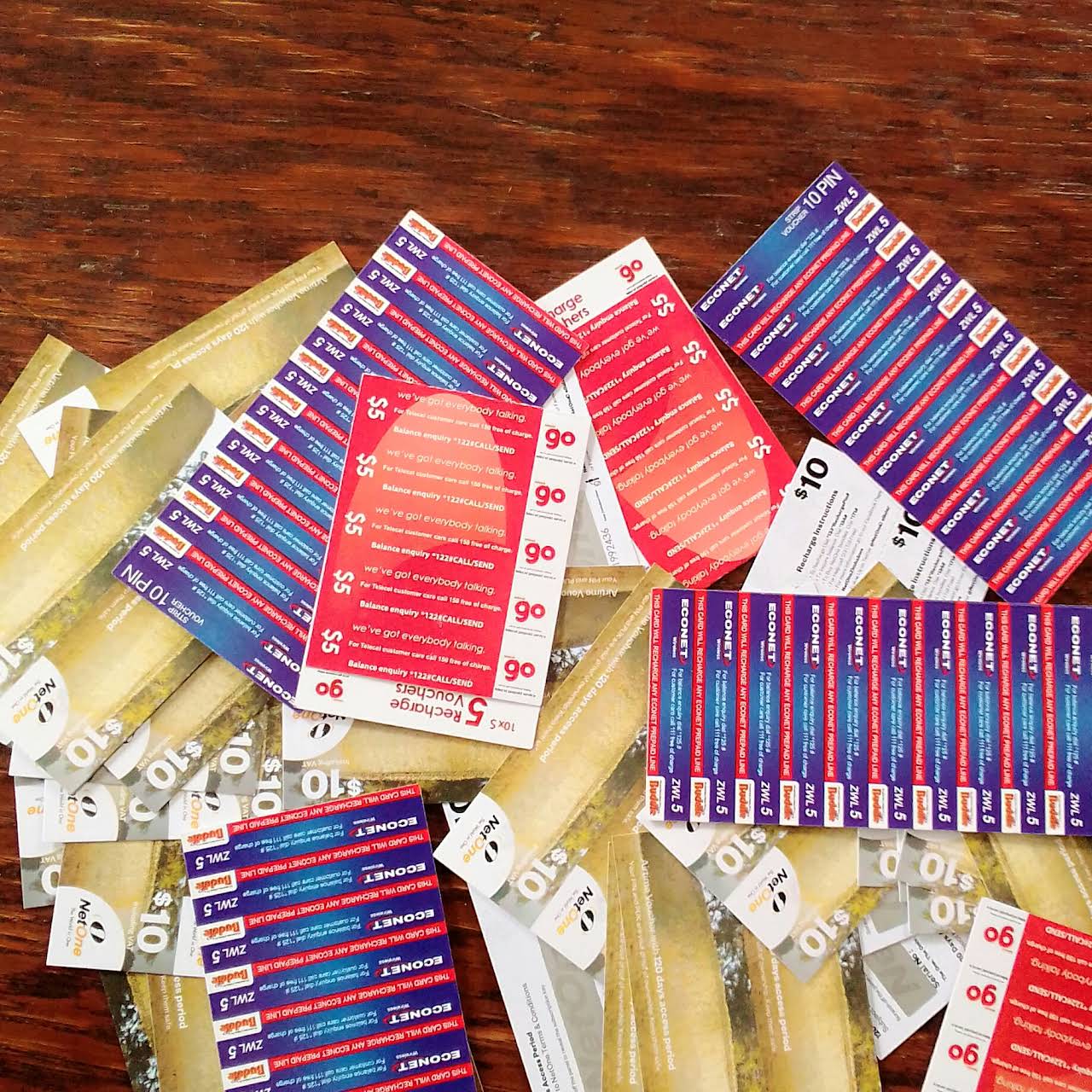Vendors cry foul as RBZ phases out bulk airtime sales
THE Reserve Bank of Zimbabwe (RBZ)’s Financial Intelligence Unit has proposed the phasing out of physical bulk airtime recharge sales and put a cap on individual electronic purchases, citing the need to curb the rampant abuse of the platforms by illicit currency speculators.
The measures are contained in a circular sent to mobile network operators dated October 22, in which the Central Bank unit has stated that going forward, airtime dealers and individuals will have to use electronic recharging as physical airtime sales are being reduced to 20 percent and below.
Mobile network service providers have welcomed the proposal saying it will help them cut on production costs as well as respond to environmental concerns regarding littering. The decision has, however, sparked an outcry from bulk recharge voucher dealers and vendors who feel the proposal will cripple their business.
According to the circular, mobile telecommunication service providers have since been directed to submit a written plan to the FIU not later than November 7, detailing the measures to be taken to meet the above targets by the set dates.
This includes issuing circulars to their respective airtime distributors to enforce limits on till-point airtime voucher buyers.
“To ensure that customers purchase airtime vouchers for personal use and not for resale, a customer shall be allowed to purchase airtime of not more than $10 000 in value in any one transaction,” said the regulator.
“A customer can buy up to five vouchers at a time but not exceeding $10 000 in total.
“In order to facilitate electronic airtime recharging through customers’ mobile money wallets, individual mobile wallet holders, may with immediate effect, be allowed to conduct cash-in to their mobile money wallet, at designated outlets up to $5 000 per week. Cash-outs shall not be permissible.”
The monetary authorities have recently intensified the blitz against parallel market activities, which have largely contributed to exchange rate volatility resulting in financial market distortions.
These adverse impact of illicit cash deals are manifested in unjustified price escalation at a time when economic fundamentals are on a sound footing.
The scourge of price increases is being exacerbated by unscrupulous businesses who benefit from the official exchange rate but go on to peg their prices for goods and services using the black-market exchange rate.
The FIU said bulk airtime recharge vouchers were being abused by airtime vendors to facilitate illicit foreign currency trading and money laundering.
Specifically, it stated that airtime dealers have been buying the recharge vouchers in bulk from mobile network operators (MNOs) using local currency before disposing the same at discounted foreign currency prices.
The country’s telecommunications industry has three MNOs, Econet, Telecel and the State-owned NetOne.
“The bulk airtime traders have not been depositing the significant foreign currency so generated into the banking system but have instead channelled same to fuel trade on the foreign exchange parallel market,” said the FIU.
“In order to curb this abuse, the following measures shall apply in respect of mobile telecommunication and mobile payment providers:
“Mobile telecommunication service providers shall-take steps to reduce the production and sale of bulk physical airtime recharge vouchers and promote the increased use of electronic airtime recharge, reduce sales of physical airtime recharge to 20 percent of all airtime sales by 31 January 2022 and to 10 percent by 30 April 2022.”
Airtime dealers who spoke to Chronicle in Bulawayo yesterday said the measures will cripple their business and affect many families who depend on the trade.
“I pay bills, buy food and pay school fees for my children using money from airtime sales and if the business is banned it means I will not manage any of the mentioned things because there are no jobs in this country,” said Mr Tinashe Samuel, who operates in the city centre.
“Other business ventures are already saturated to the extent that if I start selling things like groceries, I will not get anything. Lots of jobless youths will be affected.”
A shop attendant at one of the airtime wholesalers who requested for anonymity said: “If the Government goes ahead to ban airtime selling, then I will lose my job as I am employed here full time”.
The vendors said their plight was not being attended to as they felt the Government was targeting “small fish” and leaving out big dealers who are involved into full scale illegal foreign currency trading and money laundering.
“Even if we sell airtime in forex, we don’t get much from that business,” said another vendor, who identified himself as Tapiwa Moyo.
“There are major players like forex dealers who spend the whole day in streets holding bundles of money but nothing is done to them. Why are we being targeted.”
He said the banning of airtime vouchers will affect many families especially the elderly people in rural areas where network connectivity is poor and some are not familiar with how to buy airtime using mobile money.
“Buying airtime using mobile money is a long process, which many people especially the elderly are unable to do and also in rural areas where network connection is poor it will be difficult to use mobile money to buy airtime,” he said.
The vendors said the $10 000 limit was not adequate as many people now do business online and require a lot of airtime for both voice and data requirements.
“We do voice calls with customers, we buy data for online use and that amount, which is set by the Government will not be able to sustain business.
“This will also increase pressure on till points as people will be trying to purchase airtime in shops since vendors will not be able to do that,” said Mr Cosmas Tembo.
Commenting, NetOne chief executive officer Mr Raphael Mushanawani said the FIU directive was good news as compliance to the directive will reduce the cost of production.
“We are a State-owned entity owned 100 percent by the Government of Zimbabwe. We have already gone electronic in most of our operations,” he said.
“So, for us the directive is good news to us in the sense that if you recall the Ministry of Environment had actually at some stage come up with an SI to actually ban the use of physical recharge cards and promote the use of electronic airtime.
“As far as we are concerned, that is what we are focused on and that’s what we are doing.”
The NetOne boss said the physical recharge cards they were producing were largely to cater for some of their customers in remote parts of the country where subscribers have issues in accessing the electronic system.
“But in terms of budget, I think we have reduced remarkably our cost of production of physical recharge cards. The directive to us is good news because that cost has always been a concern to us,” said Mr Mushanawani.
Econet spokesperson, Mr Fungai Mandiveyi could not be reached for a comment as he was said to be in a meeting.
However, according to the company’s 2021 annual report, Econet said it was intensifying the reduction of physical recharge cards in the market in line with the commitment to reduce waste and migrating to digital solutions.
“This initiative is also in line with our waste management plans working in collaboration with the Environmental Management Agency to reduce physical recharging,” said Econet.
“Electronic recharging is currently at 81 percent and physical is at 19 percent against an electronic target of 80 percent. The business strategy of migrating towards being digital service provider will see a reduction in physical recharging and waste generation regarding paper and related waste streams resulting in positive environmental outcomes.”-The Chronicle











